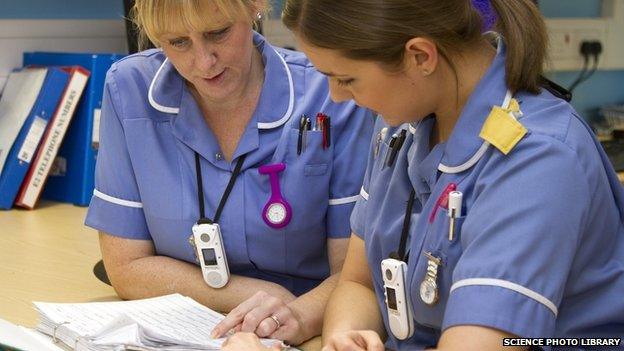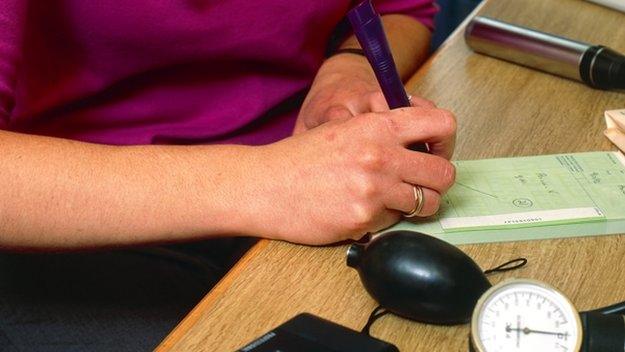Nurse cuts 'put 7-day plan at risk'
- Published

The guidelines say there must be enough nurses to give patients the assistance they need
Plans to create more seven-day services across the NHS in England are being put in jeopardy because of cuts to senior nurse posts, union leaders have warned.
Official data shows the number of nurses employed in the two most senior grades have fallen by 3% since 2010.
The Royal College of Nursing said senior nursing roles would be vital in the proposed seven-day drive.
The Department of Health said extra money was being provided to train up a "new generation" of nursing leaders.
The senior posts cover roles such as ward sisters and senior positions such as nurse consultants that lead teams.
The government has promised to recruit 5,000 new GPs and another 5,000 support staff, including practice nurses, to pave the way for the weekend opening of GP surgeries.
But there has been little detail about how the initiative will work across other areas, such as routine hospital operations and cancer care.
'Easy headlines'
While the overall workforce of nurses has been growing, the number filling senior band seven and eight roles fell by 2,295 over the past five years to just over 64,000.
Speaking ahead of the start of the RCN annual conference on Monday, the union's general secretary Peter Carter said: "Nursing staff, and above all, senior expert nurses, are a huge part of the solution to delivering seven-day care.
"Many nurses working as ward sisters or clinical experts are able to make decisions, supervise teams and educate and mentor their junior colleagues."
The issue also looks set to be a major theme of the British Medical Association's annual conference which is being held at the same time as the RCN meeting.
In his speech to open the conference, BMA leader Dr Mark Porter will say there is a need for more clarity on the seven-day working proposals.
He will say: "We all want our patients to have the care they need when they need it. So show us the detail of what you mean. Show us how the country will pay for it.
"Show us something real, because all we've seen so far is the pursuit of easy headlines."
The Department of Health said it was liaising with NHS England on the issue.
A spokeswoman said: "Ensuring we have the right number of nurses is vital. That's why we're taking the issue of nursing recruitment seriously and have prioritised and invested in frontline staff, so there are over 8,000 more nurses on our wards."
She added there were now attempts to train up a new generation of nursing leaders with extra money being provided.
- Published19 June 2015

- Published19 June 2015
- Published9 April 2015

- Published7 April 2015

- Published4 November 2014
- Published30 September 2014

- Published30 September 2014
- Published3 July 2014

- Published3 October 2013

- Published14 April 2014

- Published24 December 2013

- Published1 October 2013

- Published1 October 2013